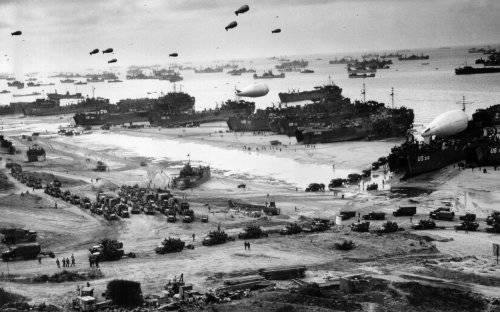British intelligence declassified Hitler’s plans
The British State Archives declassified the interrogation report of a German soldier Werner Janowski, which describes in detail the plan to seize Britain. According to this plan, the German soldiers were supposed to fraudulently penetrate the territory of Great Britain, disguised in British military uniforms, reports the British BBC TV news agency on Thursday.
The major British port of Dover was to be subjected to the main attack, German troops also had to land along the entire southern coast, as well as in Scotland and in the south of Ireland, Interfax reports.
This plan was never put into action. Hitler decided to abandon him, because the German aviation was unable to defeat British royal aviation, and without an air superiority, German troops were too vulnerable.
However, the Wehrmacht military personnel practiced the landing tactics on the beaches of France in September-October 1940. If the landing of German soldiers in Britain took place, then, according to expert opinions, which leads the BBC, it could completely change the course of the Second World War.
"Around the World" says that the leadership of British intelligence was trying to predict the steps of Adolf Hitler during the Second World War, studying his horoscope. The staff astrologer of the special services was called Ludwig von Wol. Hungarian, born in Berlin, he argued that Hitler’s military plans were drawn up taking into account the predictions of the personal astrologer of the Fuhrer, the Swiss Carl Ernst Krafft. The idea of von Volya was to give the British special services a forecast similar to the one that Hitler receives. Thus, it would be possible to partly predict Hitler’s military plans and build his own military plans on the basis of more complete information.
In the early twentieth century, Britain was a predominantly maritime power with a powerful naval force. fleetbut since 1938 they began to focus on the development of aviation, which was given the task of defending the country from the air. By the beginning of World War II, there were 78 squadrons in the metropolis (1456 combat aircraft, of which 536 were bombers), most of the fleet were modern vehicles.
On the eve of the war, the general staffs of England and France agreed on some issues of cooperation in the event of war with Germany and Italy.
1 September 1939, Germany attacked Poland. On the same day, the Chamberlain government sent a note of protest to Germany, 3 September was followed by an ultimatum, then a declaration of war against Germany. However, all the time while the German troops were engaged in the East, in actions against Poland, the allied Anglo-French troops did not undertake any active hostilities on land and in the air. And the quick defeat of Poland made a temporary period during which it was possible to force Germany to fight on two fronts, very short.
As a result, the British expeditionary forces in the 1939 divisions that had been transferred to France from September 1940 to February 10 were inactive. In the American press this period was called the "Strange War." German commander A. Jodl later stated: "If we were not defeated in 1939, it was only because about the 110 French and British divisions that were standing during our war with Poland in the West against the 23 German divisions, were completely inactive."
At the same time, fighting at sea began immediately after the declaration of war. Already on September 3 was torpedoed and the English passenger ship "Athenia" sank. 5 and 6 September off the coast of Spain were sunk the ships "Bosnia", "Royal Setr" and "Rio Claro". Britain had to introduce escort ships.
14 October 1939, a German submarine under the command of Captain Prine, sank the English battleship Royal Oak, which was parked at the Scapa Flow naval base. Soon the actions of the German fleet and aviation threatened international trade and the very existence of Great Britain.
- Elena Denisova
- http://www.smi.ru"rel =" nofollow ">http://www.smi.ru

Information